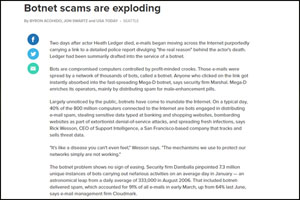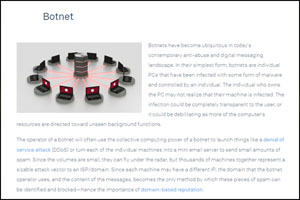Bonet Related Scams

FBI agents digging into botnet scams have uncovered a serious and growing problem: millions of computers around the world have been quietly infected. These infections have triggered major data breaches, impacting businesses, government offices, and ordinary people as well. The scammers responsible aren't just out for quick money—they're after serious targets like credit card details, sensitive business information, and even classified government files. This isn't just a tech issue or something only big organizations need to worry about. As these cyberattacks become more advanced and common, both authorities and regular internet users are under growing pressure to stay alert and protect themselves.
Botnets related to mobile phones and SMS are also picking up considerable momentum. Frauds, typically sitting in remote places, send fake SMS messages to targeted individuals, asking the recipients to open the message and any files that may be included. On accidentally opening these files, the victim's Android phone may get infected, and data can be stolen or the system may be damaged. Among the most prevalent online attacks today is botnet infections, which keep coming in a more sophisticated form. The public is highly cautioned to delete spam emails or suspicious messages, particularly those from countries like Estonia and Russia, since they may be part of a scam operation. A case with a high profile, Operation Ghost Click, attracted a lot of attention from the FBI. This scam involved a Trojan that, once installed, would immediately begin stealing or corrupting critical data. The infected systems were reportedly controlled by a criminal network operating out of Estonia, which gained remote access to users' data almost instantly. Scammers continuously develop new and unique techniques to steal data, and the public must remain vigilant and handle such threats with extreme caution.
This Trojan can quickly steal or damage important data once it's installed on a device. After it takes hold, the group behind it—believed to be operating out of Estonia—can remotely access the system and extract sensitive information right away. People should take these kinds of threats very seriously, as scammers often use clever and sophisticated tricks to get their hands on valuable data.

Scammers often fool people into downloading harmful software that's meant to steal personal information from their computers. The good news is, by following a few simple precautions, you can greatly lower your risk and keep your important data safe:
-
Act forthwith when your computer terminals or servers become extremely slow, as this could be a sign that a hacker is attempting to break into the system.
Install advanced antivirus software on all major computer systems to detect and block threatening malware.
Keep your systems up to date and stay aware of the latest tricks cyber thieves use to take advantage of security gaps.
Do not keep sensitive data like credit card numbers, expiration dates, passwords, and bank account numbers on your computer because it is very easily fall into the hands of cyber thieves.
-
Immediately report any suspicious scam or suspicious transaction to the cyber police or concerned authorities.
- .



